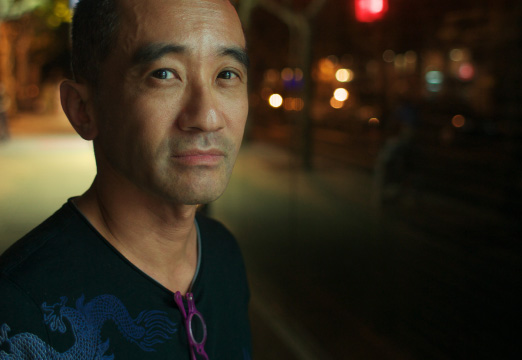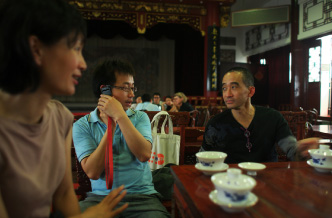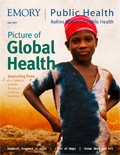Activist at Heart

Associate Professor Frank Wong estimates that 20% of male sex workers in China are in the trade because of the lack of jobs.
Frank Wong seeks to prevent HIV among Asian men
By Kay Torrance
|
Picture of Global Health |
When China's first Gay Pride Week kicked off in Shanghai last June, organizers kept it low key. There were no parades with costumes and floats. Instead, participants attended private film screenings, exhibitions, and workshops. Still, at night, revelers celebrated in Shanghai's popular gay bars. Though the government decriminalized homosexuality in 1997, it remains a largely taboo subject in China. And whether they are gay or straight, men who have sex with men often put themselves at risk, physically and emotionally, because they need work.
China's fast economic shift has left many people without jobs. As the economy has transitioned over the past 30 years, the jobless have hit the road in search of work. Approximately 140 million people are migrants, moving from place to place, and the lack of job growth has led many men to sell sex, says Frank Wong, associate professor of behavioral sciences and health education.
In particular, Wong studies "money boys" or Chinese male prostitutes. Wong is about halfway through a five-year, NIH-funded study of 1,200 men in Shanghai who have sex with men, about half of whom are prostitutes. Through his work, he has gleaned a portrait of their lives, including how HIV is affecting their ranks, all in an effort to design future interventions to prevent spread of the disease in China.

Frank Wong is working with colleagues in China to study men who have sex with men in Shanghai. He will use the data to develop interventions to prevent spread of HIV among men. Photos by Shen Yu/AP.
From his interviews with money boys, Wong estimates that 20% of male sex workers are not gay but simply in the trade because of the lack of available jobs. Other experts put the number closer to 50%.
Wong recently observed a panel discussion with Chinese sex workers, one of whom was straight and another gay. The heterosexual man appeared traumatized, Wong remembers. "I felt his pain. He was depressed but needed the money."
Gay men also struggle, emotionally and financially, in a country that has yet to recognize and legally define homosexuality. "Can these men divide their psyche?" asks Wong. "Can this be just an economic choice? No. Some Chinese men do call themselves ‘gay,' but it is unclear if they mean it in the same way as when Americans use the term. Men having sex with men is a behavior to us, but to many Chinese it is an identity."
Homosexuality and the gay sex trade are largely underground networks in mainland China. The city of Shanghai is a different case.
"Shanghai has lots of gay bars—no one blinks at them," Wong says. "Everything is about money there. The city functions fairly independently from the rest of China, hence the difference in culture. Most money boys there come from rural areas, have limited education, and have no experience living in big cities."
In addition to interviewing the men, Wong is testing them for HIV and other sexually transmitted diseases. According to UNAIDS and other sources, China experienced a 45% increase (based on improved data collection) in the number of HIV/AIDS cases among the general population in 2006 over 2005. Of these cases, more than 12% were contracted via male sex with men. For most of 2007, the number of new HIV/AIDS cases in the general population averaged more than 3,000 per month, the majority resulting from all types of sexual transmission.
Through his research, Wong found that money boys are more likely than other migrant men to use alcohol, while both groups report a low rate of condom use. Both groups also have misconceptions about HIV and AIDS. If China's government addressed syphilis and alcohol abuse in particular, he says, the HIV rate would decrease. Instead, the government is focusing on pornography as a root cause of prostitution.
In another study targeting 2,400 men in five U.S. cities, Wong is examining men of Asian and Pacific Island descent who have sex with men. While both ethnic groups collectively make up only 1% of AIDS cases in the United States, more than 66% of the groups' AIDS cases are in men having sex with men.
After white men, Asian and Pacific Island men have the highest percentage of cases resulting from homosexual transmission. In comparison, AIDS cases among African Americans are spread more evenly among heterosexual, homosexual, and drug-use transmissions.
With time, Wong plans to devise interventions to empower men having sex with men regarding their health and their social networks in the United States and in China. It is his way of protecting the health of an underserved population. Says Wong, "I'm an activist at heart."


